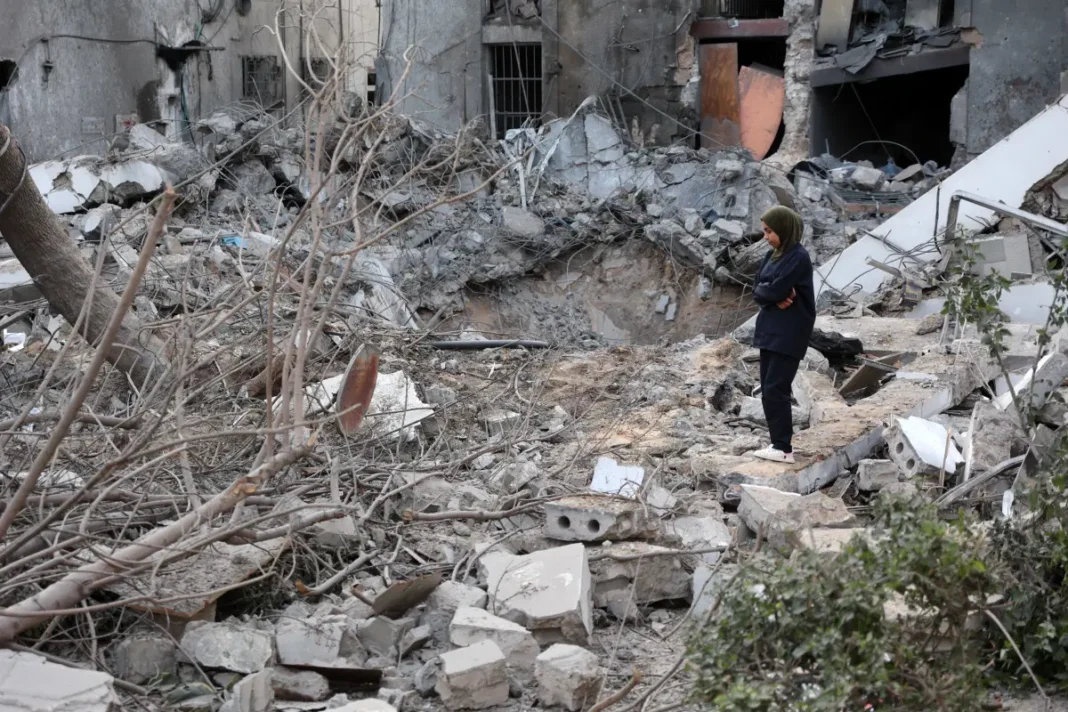Trump Acknowledges Starvation Crisis in Gaza, Promises U.S. Action Amid Escalating Conflict…Former U.S. President Donald Trump has publicly acknowledged the severe humanitarian crisis in Gaza, stating that “many people are starving” in the region.
His remarks came on the final day of his Middle East tour, during a visit to Abu Dhabi, where he offered to have the United States address the growing crisis. The comments were made against the backdrop of intensifying Israeli airstrikes on Gaza, which have left at least 93 people dead and hundreds more injured, with the majority of casualties being civilians.
Gaza has been grappling with a dire humanitarian situation for months, with the population suffering from severe shortages of food, medicine, and other vital resources. The region’s ongoing conflict, coupled with a tight Israeli blockade, has crippled the local economy and devastated infrastructure. The United Nations has reported that over 600,000 people—approximately one-quarter of Gaza’s population—are experiencing starvation, a crisis that has been exacerbated by the destruction of key facilities, including bakeries, food warehouses, and hospitals. As a result, a large portion of Gaza’s civilian population is facing extreme poverty and malnutrition, and the already overburdened medical facilities are unable to provide the necessary care.
Trump’s comments come amid the continued Israeli military operations in Gaza, which have intensified in recent days. The ongoing airstrikes are part of Israel’s effort to target Hamas militants and their infrastructure. However, these military actions have also led to widespread civilian casualties, prompting international calls for restraint and urgent humanitarian aid. The situation has become increasingly dire, with civilian casualties mounting and key infrastructure, such as power plants and water supplies, being heavily damaged.
The U.S. has long been a key player in the Middle East, and Trump’s statements on Gaza indicate his administration’s potential willingness to intervene and provide humanitarian assistance to the region. While Trump has historically been a strong supporter of Israel, his acknowledgment of the starvation crisis in Gaza marks a shift in tone. In his remarks, Trump said that the United States would take necessary steps to ensure that aid reaches the people in Gaza who are most in need.
READ MORE: Trump Highlights Gaza’s Humanitarian Crisis, Calls for Urgent Action to Address Starvation
However, Trump’s record on foreign aid is mixed. In January 2025, he signed an executive order suspending most U.S. foreign aid programs. The order had notable exceptions for emergency food assistance and military aid to certain countries, but it was widely criticized for cutting off much-needed resources to regions suffering from poverty, conflict, and natural disasters. Humanitarian groups have expressed concern that this policy could complicate efforts to address the needs of vulnerable populations in Gaza and other conflict zones.
International aid organizations have been calling for an immediate, unimpeded flow of assistance to Gaza. According to the United Nations Relief and Works Agency for Palestine Refugees (UNRWA), there has been a critical shortage of food, clean water, and medical supplies in Gaza. The blockade has made it exceedingly difficult for aid to reach those in need, and many organizations are warning that the situation will worsen without rapid intervention. Several UN agencies have also raised alarms about the risk of disease outbreaks due to inadequate sanitation and the lack of medical care.
The international community has been divided over how to address the crisis in Gaza. While some governments, including those in Europe and the Middle East, have called for an immediate ceasefire and an increase in humanitarian aid, others, like the United States under the Trump administration, have focused more on security concerns and support for Israel’s right to defend itself. The lack of a unified international response has made it more difficult to alleviate the suffering of Gaza’s residents, who continue to face bombings, displacement, and a collapse of basic services.
As the conflict continues, the human toll on Gaza’s civilian population grows. The latest figures from the Gaza Health Ministry report that hundreds of people have been killed since the recent wave of airstrikes began, and thousands more have been injured. Hospitals, overwhelmed by the volume of casualties, are struggling to provide adequate care. Many medical facilities have been forced to close or reduce services due to a lack of resources and personnel.
The urgency of the situation in Gaza continues to spark global outrage, with calls for more substantial intervention and humanitarian aid pouring in from all corners of the world. As the world watches closely, the question remains whether Trump’s promises of U.S. assistance will translate into real action, and if the international community can unite to address the humanitarian crisis in Gaza before it spirals further out of control.
Ultimately, the crisis in Gaza serves as a stark reminder of the devastating consequences of prolonged conflict, with the civilian population bearing the brunt of the suffering. While political and military solutions continue to be debated, the need for immediate humanitarian aid is more pressing than ever. Without a swift and coordinated global response, the situation in Gaza will only worsen, and many more lives may be lost.




